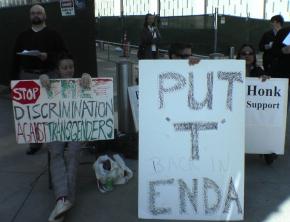The fight for LGBT equality on the job
reports on the latest version of the Employment Non-Discrimination Act.
FEW PIECES of federal legislation have as tortured and ignominious a history as the Employment Non-Discrimination Act (ENDA) currently wending its way through Congress.
The present version "would prohibit employers, employment agencies, labor organizations and joint labor management committees from firing, refusing to hire or discriminating against those employed or seeking employment on the basis of their perceived or actual sexual orientation or gender identity. Such protections are already in place prohibiting discrimination based on race, religion, gender, national origin, age and disability."
This so-called "all-inclusive ENDA," because it would provide legal protection for gender variant people as well lesbians, gays and bisexuals, would finally provide much-needed workplace rights to millions of workers who can be legally fired for being gay or lesbian in 29 states and fired for their gender identity in 38 states.
Lesbian, gay, bisexual and transgender (LGBT) activists who are encouraged by recent polls showing 89 percent-plus public support for these rights, however, shouldn't be complacent in thinking that this will be passed without vocal and visible protest.

Some version of workplace non-discrimination legislation has been languishing in the backrooms and committees of Congress for 35 years. New York Representatives Bella Abzug and Ed Koch (who later became New York City's mayor) introduced the Equality Act of 1974 to expand the civil rights of women along with gays, lesbians and unmarried people.
The legislation never received much support, and, ever since, variations of civil rights legislation have been promised then dropped by politicians who seek LGBT votes but are too timid to buck the right-wing bigots who slander the legislation as "special rights" for "deviants."
CORPORATE-RUN, Democratic Party-beholden groups such as the Human Rights Campaign (HRC) played a significant role in watering down what was once a broad civil rights bill for gays and lesbians (but not transgender people) into a narrow and less-potent piece of legislation that prohibits discrimination in (some) workplaces--ENDA.
In the past, they argued that compromise in the present is necessary to make incremental advances in the future. Religious institutions (to which the state grants tax-free status), small businesses and the military were among the workplaces kept out of the 1994 version that went down to defeat two years later.
Openly gay Congress member Barney Frank and Sen. Ted Kennedy, both liberal Democrats who are sponsors of the current bill, joined with HRC in defending the 2007 version that passed the House (not the Senate) that year, which did not include transgender people, arguing that this is the most realistic deal on offer.
To their credit, groups such as the National Gay and Lesbian Task Force and the major LGBT labor advocacy group, Pride at Work, have joined with transgender groups and hundreds of others to oppose any compromise legislation that excludes gender identity.
While President Obama has expressed his support for the all-inclusive ENDA, his recent inaction on reversing legal discrimination against LGBT people in marriage and the military--and his personal opposition to marriage equality--should serve to remind activists that mobilization for workplace equality will be crucial in deciding the fate of ENDA.
Action has already proven essential in ensuring that transgender people are not left out of the current version. Nearly 400 organizations--including legal, religious and labor groups--have signed on to the United ENDA appeal United ENDA appeal calling for an all-inclusive ENDA. Congressman Frank, Senator Kennedy and HRC can no longer justify support for any version of ENDA that doesn't include gender identity.
Transgender activists are right to argue that after more than 35 years of attempting to gain civil rights for sexual minorities, they shouldn't have to sit at the back of the bus and accept the latest gender-identity "compromise" as just another "gap," as Frank called it in 2007.
A 2006 study by the San Francisco Bay Guardian and the Transgender Law Center found that 60 percent of transgender people in San Francisco earn less than $15,300 per year, only 25 percent have a full-time job and nearly 9 percent have no source of income.
The fight for workplace equality, along with all other LGBT civil rights, is driving tens of thousands to mobilize for the October 11 National Equality March on Washington.
Initially called by Harvey Milk protégé, Cleve Jones, this mass demonstration is gaining endorsers and fire from grassroots activists across the country. Given the dubious role played by politicians of both parties in past decades, the size and political reverberations from this march can have a profound impact on determining the future of workplace and other LGBT civil rights in the months and years to come.


